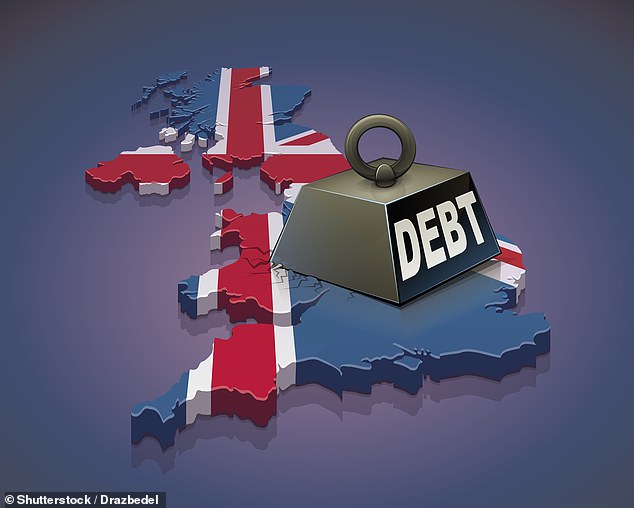Interest on government debt exceeds £100 billion a year due to Labor budget borrowing boom
Britain will spend more than half a trillion pounds servicing its national debt between now and the end of this decade, budget documents show.
The Office for Budget Responsibility said interest payments on debt between 2024-25 and 2029-30 would total £672 billion – or more than £100 billion a year. T
The annual bill dwarfs the defense budget, which is expected to reach £83 billion next year.

Ball in the chain: The Office for Budget Responsibility said interest payments on debt will reach £672 billion between now and 2029-30 – or more than £100 billion a year
The expected cost of servicing the debt has soared following this week’s budget, which saw Rachel Reeves embark on a dramatic borrowing spree to fund her spending plans.
The Chancellor will have borrowed a further £536 billion by the end of the decade, taking the national debt above £3 trillion for the first time.
Instead of borrowing falling from £87 billion this year to £39 billion in 2028-29, as planned by previous Chancellor Jeremy Hunt, the deficit under Reeves will reach £127 billion this year and only fall to £70 billion.
The Office for Budget Responsibility described the budget as “one of the largest fiscal easings of any budget event in recent decades.”
Public debt was around £350 billion at the turn of the millennium but has since soared, partly due to a series of crises including the financial crash and the Covid-19 pandemic.
While it took three centuries of borrowing before the debt reached £350 billion, Reeves will borrow the same again in just over three years.
The borrowing binge has caused unrest on the bond markets, with the yield on ten-year government bonds rising above 4.5 percent yesterday for the first time in a year.
Rising interest payments on debt mean the government will have to raise significantly more taxes than it spends on public services, according to the Institute for Fiscal Studies.
IFS director Paul Johnson said: ‘We need to achieve substantial primary surpluses to prevent debt default.
“That means the government must take more from us in tax and other revenue than it gives back in everything except interest payments on debt.
“That’s not a nice place to be, it’s not a place we’ve been for very long, but the government has no choice in the matter.”
DIY INVESTMENT PLATFORMS

A.J. Bell

A.J. Bell
Easy investing and ready-made portfolios

Hargreaves Lansdown

Hargreaves Lansdown
Free fund trading and investment ideas

interactive investor

interactive investor
Invest for a fixed amount from € 4.99 per month

Sax

Sax
Get £200 back in trading fees

Trade 212

Trade 212
Free trading and no account fees
Affiliate links: If you purchase a product, This is Money may earn a commission. These deals have been chosen by our editors because we believe they are worth highlighting. This does not affect our editorial independence.
